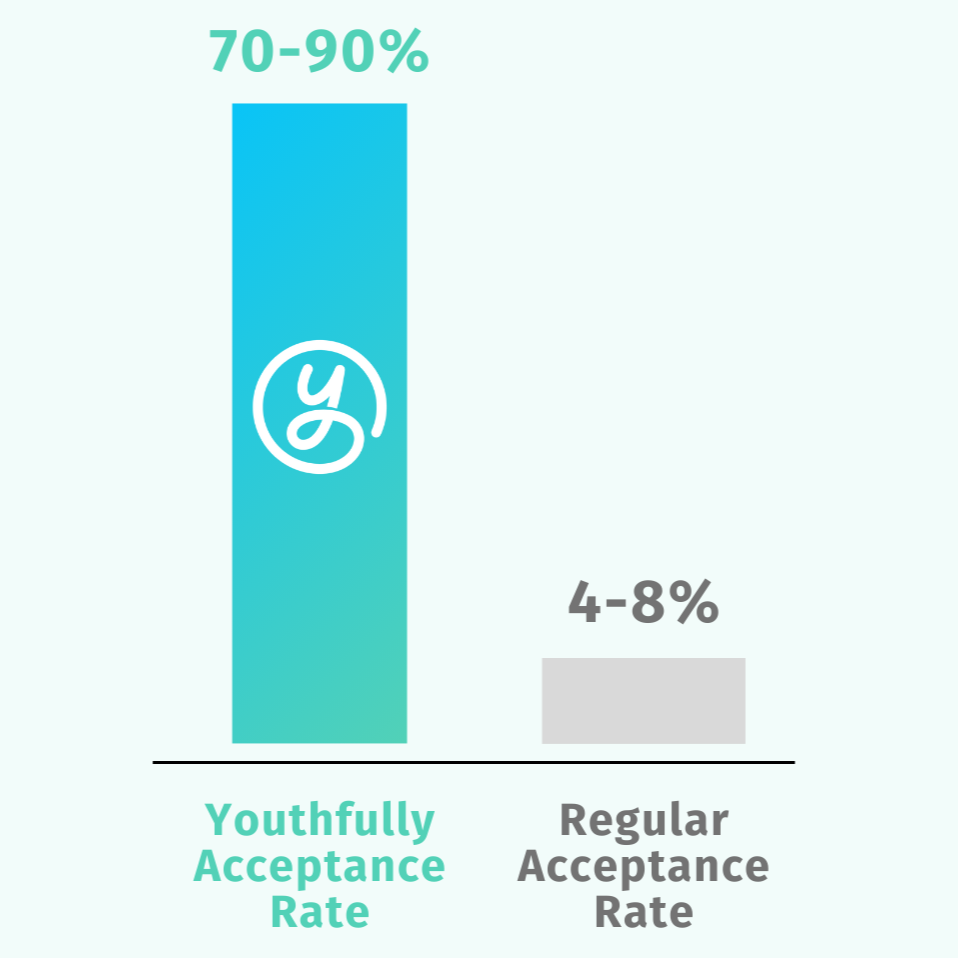The race for university admissions has already begun. Are you sprinting or standing still?
What is the Summer Sprint?
The Summer Sprint is your final chance to build momentum before Grade 12 begins. While most students slow down, you can strategically jump ahead with a clear plan.
From June through August, smart students use this time to:
✅ Lock in their supplementary app strategy
✅ Strengthen gaps in their candidacy
✅ Launch standout extracurriculars or internships
✅ Practice personal storytelling and interview skills
✅ Build a narrative that makes admissions officers take notice
The students who ‘win’ in admissions don’t start in September. They train in the off-season. Think of the Summer Spring as your Final Lap. Where you finish depends on how you start!
The rest of this blog post will walk you through how to maximize the Summer Sprint.
If you’re interested in personalized support for admissions, schedule a free consultation to see if 1:1 coaching is right for you!

Why the Summer Sprint Matters?
Most students misuse their summers. They go to camp, work part-time jobs, or relax before Grade 12, thinking they’ll “deal with applications later.”
But the truth is: there’s no off-season for students who get into top programs like Ivey, Rotman, Queen’s Commerce, Waterloo Engineering, McMaster BHSc, or UBC Sauder.
Top candidates use the summer to get ahead, and it shows.
At Youthfully, students who work with a coach during the summer see acceptance rates of 70–90%, compared to the 4–8% national average.

This is because students who take advantage of the Summer Sprint have a strategy and game plan going into admissions.
Instead of scrambling and piecing together their applications to “get it done”, they’ve meticulously planned and filled potential gaps in their candidacy before the chaos of grade 12.
Every year, students who delay their applications sincerely regret it.
When they realize they don’t have a unique angle, it’s too late. By then, their extracurriculars are sub-par, or their responses are not polished where they need to be.
The hard truth is that many of these students had the potential to get in, but they didn’t use their time wisely.
Let this be your wake-up call!
Get into top universities with an expert coach.
get a youth coach™Stephanie
Non-profit Founder
Youth Coach™

Being a top candidate is about more than just having grades in the 90s. You need a plan and strategy to differentiate yourself from your peers. Otherwise, you risk submitting unoriginal, mediocre work that doesn’t stand out to the admissions committee.
Admissions officers can tell the difference between rushed applications and ones that have been carefully curated.
If you’re unsure how to maximize the Summer Sprint or need some accountability to stay on top of your applications, consider working with a Youthfully Coach.
Book a free consultation today to learn more about how we can make your admission goals a reality.
The Secret: What Top Students Do During the Summer Sprint
So by now, you’re likely thinking, “I get it. I need to start preparing now, but what should I be doing?”
Well, the Summer Sprint is broken down into 3 phases.
Each phase can be more important to one student than another, so it’s important to have a non-biased perspective of where you stand.
Phase 1: Refine Your Application Strategy
Clarity is key. University admissions are more competitive than ever. You need a clear roadmap and strategy to maximize your chances of success.
You can’t be another student who “works really hard” or “has always wanted to study X”. Having good grades and a passion for the field of study is what everyone claims to have. What makes you different?
Seriously, get honest with yourself and really think about what would make you unique in the eyes of an admissions officer. How can you stand out from all the other high-performing applicants so you’re not leaving things up to chance?
That’s why phase 1 is to think about your application strategy and the narrative you are telling throughout the process.
What is your personal narrative and positioning? What are your differentiators and supporting stories?
Students who make a memorable first impression with admission officers tell a story that fully captures the narrative they are selling. It showcases the self-awareness, maturity, and introspection that top programs are evaluating for.
Your grades and test scores might get you considered, but your story is what secures your spot.
A strong, compelling narrative transforms your supplementary applications from a list of accomplishments into a persuasive case for why you belong at that school.
Yet, this is where many applicants go wrong. They highlight generic leadership roles without demonstrating real impact, express a passion for a subject without showing meaningful engagement, or rely on common experiences that don’t make them stand out.
Take Owen’s story as an example. Owen had his sights set on a top business school but felt he lacked a strategic edge. Like many students, he was unsure of what to expect from supplementary applications and didn’t know how to position his experiences effectively.
His background was heavily rooted in sports and community involvement, but without a clear strategy, his application risked sounding like every other student-athlete.
Working with a Youthfully Coach, Owen identified a unique angle that made his story stand out. He carefully framed his experiences to highlight personal growth, leadership, and initiative in a way that aligned with what top business schools look for in applicants.
Through this strategic approach, Owen was accepted into his top-choice program, Ivey, as well as Queen’s Commerce and Rotman Commerce.
A well-crafted strategy makes all the difference. If you’re unsure how to structure your application or what makes your story stand out, now is the time to start.
Book a free consultation today and take the first step toward a winning application.
Phase 2: Strengthening Your Candidacy
With such high volumes, admissions officers often see the same profiles over and over again:
- High-achieving students with 90%+ averages
- Generic extracurriculars like clubs, volunteering, and tutoring
- Common Leadership positions such as student council, club executive, or a sports captain, etc.
With thousands of applicants checking the same boxes, it becomes nearly impossible for admissions officers to tell one student from another.
So, how do you stand out? You do what 99% of students won’t do.
Admissions officers aren’t just looking for students who follow the typical path… they want applicants who take initiative, think differently, and make an impact.
The top 1% of applicants don’t just participate, they create, lead, research, and innovate.
That’s why launching a Tier-1 extracurricular is one of the most effective ways to differentiate yourself from the competition.
Not only will it make you memorable to admissions officers, but it will also help you develop the exact skills that top programs look for: leadership, problem-solving, initiative, and creativity.
Now, there are two powerful ways to achieve this:
A Passion Project – Instead of simply joining a club, build something of your own. Start a business, develop an AI model, publish a research paper—whatever best showcases your skills and interests. This level of initiative makes you memorable to admissions officers.
An Internship Experience – Gaining real-world professional experience sets you apart from the thousands of students with generic part-time jobs. An internship helps you develop in-demand skills, build connections, and show universities that you’re serious about your field.
Take William as an example. William wanted to get into a top Computer Science program, but knew grades alone wouldn’t be enough.
Through his Summer Sprint, he participated in an AI internship that pushed him to solve real-world problems. The project? Building and fine-tuning an AI model using OpenAI’s GPT API.
It wasn’t easy; his code broke, and there were no clear instructions. But with guidance from his Youthfully Coach, he learned to troubleshoot, adapt, and think critically.
After weeks of trial and error, he created a fully functional AI model and a 14-page report showcasing his findings. This experience proved his initiative and problem-solving ability, qualities that top universities look for.
Book a free consultation to be like William or thousands of other students who partnered with Youthfully to take advantage of the Summer Sprint. Your future self will thank you.
Phase 3: Train for Supplementary Apps
Think of yourself as a professional athlete about to go into training camp. For the non-athletes reading this blog, training camp is designed to prime yourself for competition. This way, you can hit the ground running.
The same thing applies to preparing for Supplementary Applications. Why wait until they are released to begin practicing?
Many students believe that because they change the questions each year or the format might change, that there’s nothing they can do to prepare. This couldn’t be further from the truth.
The applications and generally the same each year. Of course, questions will be changed, however, most schools have a certain set of traits they’re evaluating for.
For example, we know Ivey likes to see students who have: Teamwork, Achievement, Commitment, and Initiative.
During the Summer Sprint, it’s incredibly valuable to understand the unique traits and core values each program looks for, and to begin reflecting on the key experiences in your life when you’ve demonstrated them.
By scouring the websites, asking alumni, or a Youthfully coach, you can get a deeper sense of what traits these schools are looking for in their students.
When you finally have a good indication of what you want to say (and a compelling story that goes along with it!), the next step is to practice your delivery… the “HOW” you’re going to say it!
For most students, there are two components of the supp apps they need to train for:
- Essays or Timed Written Responses – This could be anything from a short 200-character response, to a 500-word essay to having 10 minutes to craft a 300-word response.
- Video Interview Responses – Most students are faced with 2-5 questions in which they have approximately 60 seconds to think of a response and usually around 90 seconds to record their answer.
Let’s talk about the essays first. Here are a few facts:
- Schools teach students how to write academic essays, yet students need to write in a narrative style
- Students don’t have much practice writing about themselves
- Many students don’t enjoy writing about themselves
- Many students undersell their accomplishments and experiences
- Most students write about the same things that are not differentiators
For these reasons and probably a few others we’re likely forgetting, it’s invaluable to practice writing with last year’s essay prompts. And if you want to take your writing to the next level, get feedback from an expert. Someone who can help you refine your tone, structure, and storytelling.
Secondly, let’s dive into the video interview portion. This is single-handedly the easiest way for a student to stand out from their peers.
Let’s face it, in the digital era, the majority of students have shortcomings when it comes to communication skills. Schools are so focused on delivering a curriculum, no one is really teaching students these essential soft skills.
Imagine an admissions officer reviewing hundreds of dreadful video responses, and then they come across the one polished student who’s been practicing all summer. Strong camera presence, no filler words, good eye contact, not talking too fast or too slow. That would be quite a breath of fresh air.
Unfortunately, these communication skills don’t happen overnight. It takes time, repetition, and feedback in order to get it right. That’s why taking a structured approach through the Summer Sprint allows students to put their best foot forward.
By partnering with a Youthfully coach, you will get the guidance and support you’re looking for across the essays and video responses. Check out what Andreas’ mother had to say about how the coach got him prepared for his applications.
The Time to Act is NOW
Maybe you want to get into Waterloo Engineering like Prabhgun.
Or perhaps you want to get into Queen’s Commerce like Stephanie.
The Summer Sprint is your moment to accelerate and leave the competition behind.
Students who wait? They cram. They panic. They submit rushed, forgettable applications.
Students who sprint now? They build, refine, and dominate.
Every day that passes is a lost opportunity to build a stronger application. You choose the race you run.
This is your last chance to book a free consultation to turn your summer into the ultimate strategic advantage. Let’s win this together.

